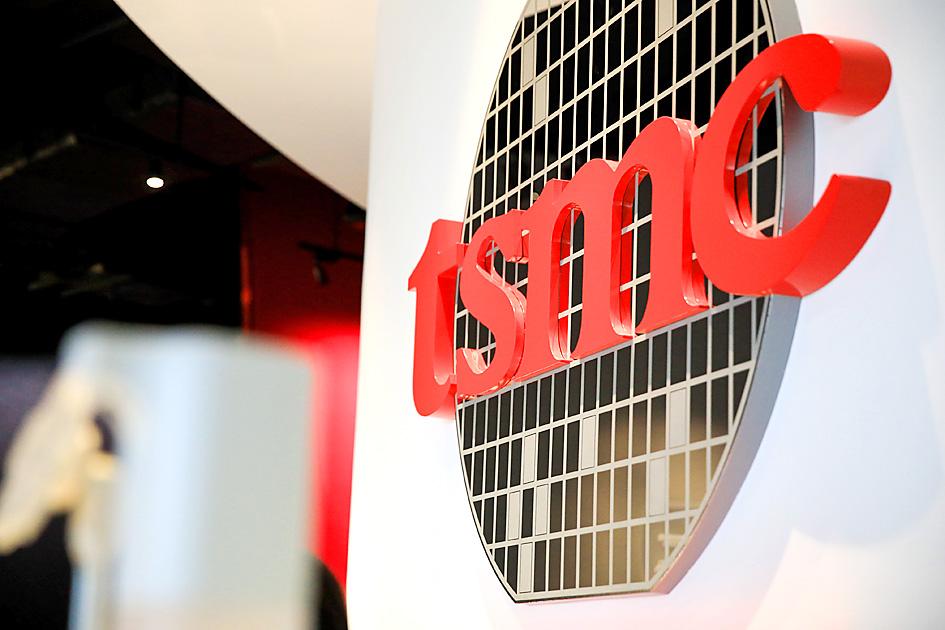Sales from Taiwan Semiconductor Manufacturing Co’s (TSMC, 台積電) largest customer grew to account for 26 percent of the chipmaker’s total revenue last year.
Although TSMC financial data did not specify the customer, analysts said they suspect it was Apple Inc.
TSMC’s largest customer contributed NT$405.4 billion (US$14.27 billion) to the chipmaker’s sales, up NT$68.63 billion or 20.37 percent from 2020.

Photo: I-Hwa Cheng, Bloomberg
That brought the largest customer’s share of TSMC’s sales to 26 percent, up from 25 percent a year earlier.
The data reinforced analysts’ suspicions that the customer is Apple, as revenue from its TSMC orders grew more than 20 percent from a year earlier.
TSMC’s consolidated revenue reached a record NT$1.587 trillion last year, up 18.53 percent from 2020, on the back of emerging technologies such as 5G and Internet of Things applications, high-performance computing devices and automotive electronics.
TSMC is believed to be the sole supplier of A-series processors for Apple’s iPhone line because of the chipmaker’s advanced 5-nanometer process, which is the latest technology the Taiwanese company has used for commercial production, analysts said.
Apple’s Mac and iPad lines have also used TSMC’s chips, analysts said.
Apple last week unveiled the M1 Ultra chip, which the company says is the next leap forward for its silicon program and the Mac.
Analysts said that TSMC is expected to benefit from the debut of the M1 Ultra chip this year.
Last year, TSMC’s second-largest customer contributed NT$153.74 billion to its sales, accounting for 10 percent of the chipmaker’s total, company data showed.
Analysts said they suspect the customer was Advanced Micro Devices Inc (AMD).
TSMC’s data indicated it was the first time sales from its second-largest customer rose to 10 percent of its total sales.
The US market was the largest buyer of TSMC’s chips last year, generating NT$1.01 trillion in sales, up 24 percent from a year earlier, and making up 64 percent of the chipmaker’s total.
That was followed by Taiwan, where the company generated NT$203.96 billion in sales, a 58 percent increase from a year earlier and accounting for 12.8 percent of TSMC’s total sales.
China was third, generating NT$164.55 billion in sales, down 29.6 percent from a year earlier and representing 10.3 percent of the chipmaker’s total sales, TSMC’s data showed.
Analysts said the decline in sales to China largely reflected Washington’s sanctions against Huawei Technologies Co (華為), which led to TSMC halting shipments to the Chinese firm.
TSMC said its 7-nanometer process created NT$440.38 billion in sales last year, up 11.5 percent from a year earlier, while the 5-nanometer process registered NT$262.33 billion in sales, up 188 percent from a year earlier. The technologies were the major sources of sales for TSMC.
TSMC is developing the more sophisticated 3 and 2-nanometer processes, and it is set to start mass production using 3-nanometer technology in the second half of the year.

KEEPING UP: The acquisition of a cleanroom in Taiwan would enable Micron to increase production in a market where demand continues to outpace supply, a Micron official said Micron Technology Inc has signed a letter of intent to buy a fabrication site in Taiwan from Powerchip Semiconductor Manufacturing Corp (力積電) for US$1.8 billion to expand its production of memory chips. Micron would take control of the P5 site in Miaoli County’s Tongluo Township (銅鑼) and plans to ramp up DRAM production in phases after the transaction closes in the second quarter, the company said in a statement on Saturday. The acquisition includes an existing 12 inch fab cleanroom of 27,871m2 and would further position Micron to address growing global demand for memory solutions, the company said. Micron expects the transaction to

Vincent Wei led fellow Singaporean farmers around an empty Malaysian plot, laying out plans for a greenhouse and rows of leafy vegetables. What he pitched was not just space for crops, but a lifeline for growers struggling to make ends meet in a city-state with high prices and little vacant land. The future agriculture hub is part of a joint special economic zone launched last year by the two neighbors, expected to cost US$123 million and produce 10,000 tonnes of fresh produce annually. It is attracting Singaporean farmers with promises of cheaper land, labor and energy just over the border.

US actor Matthew McConaughey has filed recordings of his image and voice with US patent authorities to protect them from unauthorized usage by artificial intelligence (AI) platforms, a representative said earlier this week. Several video clips and audio recordings were registered by the commercial arm of the Just Keep Livin’ Foundation, a non-profit created by the Oscar-winning actor and his wife, Camila, according to the US Patent and Trademark Office database. Many artists are increasingly concerned about the uncontrolled use of their image via generative AI since the rollout of ChatGPT and other AI-powered tools. Several US states have adopted

A proposed billionaires’ tax in California has ignited a political uproar in Silicon Valley, with tech titans threatening to leave the state while California Governor Gavin Newsom of the Democratic Party maneuvers to defeat a levy that he fears would lead to an exodus of wealth. A technology mecca, California has more billionaires than any other US state — a few hundred, by some estimates. About half its personal income tax revenue, a financial backbone in the nearly US$350 billion budget, comes from the top 1 percent of earners. A large healthcare union is attempting to place a proposal before